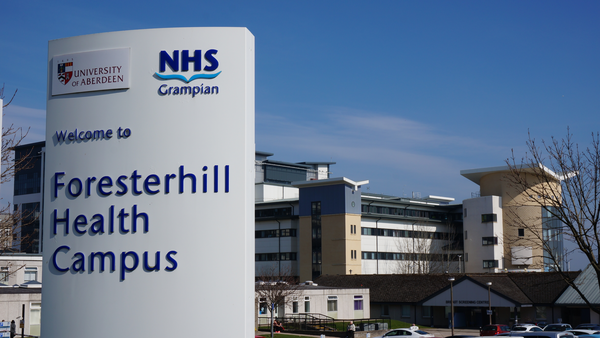Andrea Canale

Health Data Science combines health research, statistics and computing sciences to address health and care problems using data. Our MSc programme enables students from both healthcare and computational backgrounds to develop their health data science skills, supported by an interdisciplinary team of academics, NHS and industrial partners.
MSc Health Data Science is also available to study part-time online.
Nationally and internationally there is a critical shortage in data intensive analytic capacity applied to healthcare. The effective and efficient use of data has the potential to create the transformative step change needed through targeting health and care improvement.
Our interdisciplinary MSc in Health Data Science aims to develop the next generation of health data scientists. The programme is delivered by academics from our Aberdeen Centre for Health Data Science (ACHDS). The Centre for Health Data Science aims are to create innovative, interdisciplinary, data science solutions to the big challenges for health and health care, to improve health for individuals, local communities and globally.
The programme offers a wide range of specialist elective options to allow students to build a personalised masters depending on their background, interests and skills and includes a work-based placement or research project. At the end of the programme students will be able to evaluate, critique and demonstrate competency in the practical application of current data intensive analytical methods and current health and care research methods.
The MSc is ideally suited to healthcare professionals who wish to develop data health science skills or for students from computational and/or data intensive science backgrounds who wish to work in the health sector.
Students must take the following courses:
15 Credit Points
This course in Applied Statistics focuses on the application of statistical techniques in postgraduate research for health professionals, with a particular emphasis on the correct interpretation of statistical analyses results. The course will NOT focus on the statistical theory underlying the subject. An important component of the course is the use of a statistical package (IBM SPSS), which can be used to implement all the methods taught on this course.
This course, which is prescribed for all taught postgraduate students, is studied entirely online, takes approximately 5-6 hours to complete and can be taken in one sitting, or spread across a number of weeks.
Topics include orientation overview, equality and diversity, health, safety and cyber security and how to make the most of your time at university in relation to careers and employability.
Successful completion of this course will be recorded on your Enhanced Transcript as ‘Achieved’.
Students select TWO courses from the following:
15 Credit Points
This course in applied epidemiology gives an introduction to disease measurement at a population level, basic epidemiological study design and analysis, and provides an understanding of key methodological issues needed to apply when designing – or critically appraising – an epidemiological study.
15 Credit Points
This course will be of interest to anyone who wishes to learn to design and query databases. The course aims to teach the material using case studies from real-world applications. You will develop a critical understanding of the principal theories, principles and concepts, such as modelling techniques used in the design, administration and security of database systems. You will also learn core theoretical concepts such as relational algebra, file organisation and indexing. At the end of this course you will be able to design and build Web and cloud-based databases and have a critical understanding of how database-driven applications operate.
15 Credit Points
Fundamentals of research design provides the student with skills in both quantitative and qualitative design enabling the student to plan ethical research in a health context. Students are taken through each step - from formulating the research question, to study design, sample selection, methods for data collection to dissemination of results.
Upon completion of this course you will be able to:
15 Credit Points
Resources available for the provision and payment for health care are limited. However, knowledge of economics helps ensure that available resources are used in the most effective way possible. Economics allows more informed decision making about a variety of issues: choosing between alternative treatments; setting priorities between patients; choosing between alternative new technologies; organising the provision of health care.
In this course students will acquire a knowledge and understanding of:
Students must take the following courses:
Students must select TWO courses from the following:
PU5569: Understanding and applying regression models (15 credits)
15 Credit Points
Data Science is an interdisciplinary field that seeks to identify and understand phenomena captured in structured or unstructured data, extract insights, and add value by generating predictions that aid optimization of processes and equipment. These techniques show considerable promise for bringing about a revolution, increasing the significance and value of owning and collecting data of all types. This course introduces the common techniques and considers the implications for data managers.
15 Credit Points
This course will equip students with the relevant skills to interpret and conduct systematic reviews on the effectiveness of healthcare interventions. Using lectures and practical sessions, students will understand the principles of systematic reviewing and the differences between narrative and systematic reviews. They will learn to formulate a clear research question and undertake each stage of systematic reviewing of randomised controlled trials. They will also learn about the importance of the levels of evidence and systematic reviews of other different study designs. This course will also introduce the students to advances in systematic reviews such as network meta-analysis and use of Individual Patient Data (IPD)
15 Credit Points
This work-based placement elective offers a professional placement with a government/public, civic or voluntary health and/or development sector organisation. You will undertake a ten-week placement with your host organisation, either within the organisation, remotely from Aberdeen, or using a combination of both. Placements are subject to availability and are offered on a competitive basis.
15 Credit Points
The course aims to instill knowledge but, much more importantly, stimulate students’ thinking about the major challenges within different health systems and the options for the health services management. Furthermore, it aims to take a genuinely international perspective on health care, providing knowledge of different health care systems and encouraging comparison and critique. It covers a wide variety of topics including an overview of the health systems around the world, the effects of social inequalities on health inequalities and their repercussions for social policy and issues of public health policy towards tobacco, alcohol and obesity.
Select either the 60 credit course or two 30 credit courses:
OR
60 Credit Points
This course offers students the opportunity to complete a substantial piece of data-driven, empirical work within their field of study under the supervision of an experienced researcher.
Topics available will be varied but within the domain of their field of study. Alongside supervisors, students will identify a suitable topic area, describe an appropriate study design and implement an empirical study to be completed within a laboratory setting. Students will be involved alongside the supervisors in the process of defining the research question, and developing the research plan and, where appropriate, obtaining regulatory approvals. This course is for non-laboratory based projects (if you are intending to undertake a project in a scientific laboratory setting you should register on MB5913)
30 Credit Points
This work-based placement elective offers a professional placement with a civic, government, industrial, public, research or voluntary health and/or development sector organisation. You will undertake a ten-week placement with your host organisation, either within the organisation, remotely from Aberdeen, or using a combination of both. Placements are subject to availability and are offered on a best match basis.
We will endeavour to make all course options available; however, these may be subject to timetabling and other constraints. Please see our InfoHub pages for further information.
| Fee category | Cost |
|---|---|
| EU / International students | £23,800 |
| Tuition Fees for 2024/25 Academic Year | |
| UK | £11,100 |
| Tuition Fees for 2024/25 Academic Year |
Further Information about tuition fees and the cost of living in Aberdeen
HDR UK is partnering with Diabetes UK and Alzheimer's Research UK to offer £10,000 scholarships to fund talented students through master's degrees and enable them to carry out valuable real-world health data science research. Applications are welcomed from students holding an offer to study our MSc Health Data Science starting in September 2023. Applications close on Friday 19th May 2023. To find out if you meet the entry requirements email learn@hdruk.ac.uk or visit the HDR UK website.
Self-funded international students enrolling on postgraduate taught (PGT) programmes will receive one of our Aberdeen Global Scholarships, ranging from £3000 to £8,500, depending on your domicile country. Learn more about the Aberdeen Global Scholarships here.
To see our full range of scholarships, visit our Funding Database.
The programme will involve a variety of teaching methods including face to face lectures, tutorials, PowerPoint videos with accompanying self-tests and quizzes, video interviews with accompanying guides, computer-based practical sessions, self-study of recommended reading material and discussion boards. This mixed approach to teaching ensures that a range of different learning opportunities are provided for all students.
A variety of different approaches are combined to assess student understanding, progress and performance throughout the programme. Both formative and summative assessments include reflective learning, writing computer programmes, written and activity-based assessments, structured and multiple-choice questions. Whenever possible, the assessment will utilise real life scenarios and/or data and equip the student with transferable skills for subsequent careers.
The information below is provided as a guide only and does not guarantee entry to the University of Aberdeen.
Applicants will usually possess an undergraduate degree at a minimum of 2:1 or equivalent in a relevant discipline including life sciences, medicine, computing and maths. Other relevant work experience will also be considered.
Please enter your country to view country-specific entry requirements.
To study for a Postgraduate Taught degree at the University of Aberdeen it is essential that you can speak, understand, read, and write English fluently. The minimum requirements for this degree are as follows:
IELTS Academic:
OVERALL - 6.5 with: Listening - 5.5; Reading - 6.0; Speaking - 5.5; Writing - 6.0
TOEFL iBT:
OVERALL - 90 with: Listening - 17; Reading - 21; Speaking - 20; Writing - 21
PTE Academic:
OVERALL - 62 with: Listening - 59; Reading - 59; Speaking - 59; Writing - 59
Cambridge English B2 First, C1 Advanced or C2 Proficiency:
OVERALL - 176 with: Listening - 162; Reading - 169; Speaking - 162; Writing - 169
Read more about specific English Language requirements here.
You will be required to supply the following documentation with your application as proof you meet the entry requirements of this degree programme. If you have not yet completed your current programme of study, then you can still apply and you can provide your Degree Certificate at a later date.
Health Data Science is a rapid growth area and the Academy for Medical Sciences and Health Foundation have both identified the significant shortage of skilled workforce in this field. This shortage is recognised in both the UK and internationally.
Graduates will have the skills needed for a range of careers in Academia, NHS and Industry that involve the analysis and interpretation of health data. Students completing this programme with a commendation or above would also be eligible for consideration to undertake PhD study in this area.
Enhancing student’s employability is a key focus of the programme and engagement with potential employers will be facilitated by our existing partnerships with companies and public bodies including the NHS and Opportunity North East (ONE) business development framework.
You will be taught by a range of experts including professors, lecturers, teaching fellows and postgraduate tutors. Staff changes will occur from time to time; please see our InfoHub pages for further information.

The Health Sciences building, located on the Foresterhill Health Campus, houses the purpose built Clinical Research Facility, researchers from the Institute of Applied Health Sciences and the Imaging Department which boasts state-of-the-art equipment

The Foresterhill Health Campus is one of the largest clinical complexes in Europe which includes the Medical School, large teaching hospital, the Institute of Medical Sciences and the Rowett Institute.
The Centre for Health Data Science is a partnership between the University of Aberdeen, NHS Grampian and NHS Research & Development North Node.
Find out more